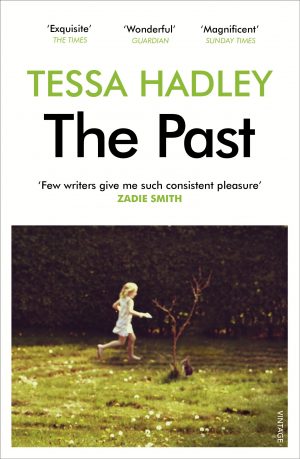The story of a childhood summer home in the verdant Somerset countryside from one of England’s foremost contemporary novelists, The Past by Tessa Hadley is a breathtaking exploration of human interiority and interconnectedness. It is the account of four adult siblings, some with spouses and children and some notably without, and their last summer in the cottage as they decide whether or not to sell it.
In a household long ago bruised by a mother’s early death and an absent father, the character-driven plot meditates upon various relationships: the frustrations between sentimental Alice and her private, logic-oriented brother Roland, the youthfully cautious romance between Alice’s ex-boyfriend’s indifferent son Kasim and Roland’s daughter Molly, and the surprising friendship between Roland’s third wife Pilar, an elegant and powerful Argentinian trying to hide a difficult family life, and her sister-in-law Harriet, a sparse and hard woman on her own quiet but desperate search for intimacy.
Hadley’s prose is the sharpest tool in a box of astonishing breadth. Her descriptive skill stuck with me days after reading, making me mark passages to which I mentally return again and again: “the swollen moon fumed with light” was a particular favorite, as well as Hadley’s inventive turn of phrase in casting a dog “sloping” down a hill. Her luxuriant prose finds an exultant place in the mist of the Somerset countryside, teeming with streams to splash in, bugs to catch, dilapidated fences, and the picturesque summer home around which the story revolves. It is a wonder to read.
No less than her prose is her masterful ability to render character, in particular inner life and its expressions. The complexity and quirks of the family allows the three weeks spent in the sleepy town to take on a refined vivacity. The siblings and their relations are not just believable but recognizable, and I found Hadley putting words to my own fears and joys with dazzling exactitude. One particular strength is the inner world of children, which I marvelled and smiled at; Hadley also investigates the overlap between the personal and the political, an issue increasingly relevant to today’s world.
For a book that cries out to be compared with Virginia Woolf’s To the Lighthouse, Hadley steers clear of Woolf’s sometimes nihilistic tone. Yet the novel is not without its own—subtle—handling of existential concerns. The story stubbornly deals with the unremarkable, demanding from us that we find significance in even the most everyday events and encouraging us to apply the same lens to our own lives. Of the moment but resolutely un-momentous, the book reminds us that, for us as well as the characters, life continues in much the same way once the story ends.
My one grievance with the novel is that it is almost too well-written, almost crafted. And yet, the line between art and artifice has always been slim, and this was an excellent problem to have. Ultimately, Hadley’s mastery of language untangles experience with the finest-toothed of combs, rendering our everyday, shared world as lush as a summer morning.
The Past by Tessa Hadley is published by Vintage, 368 pages.





